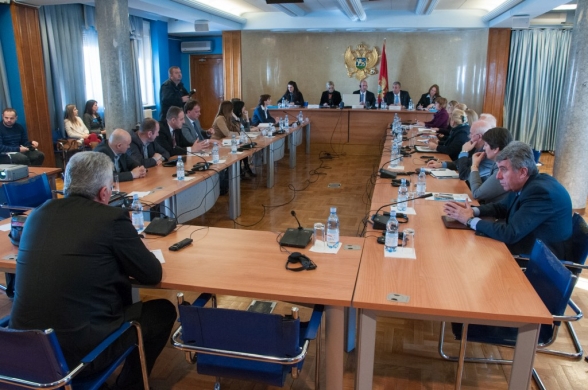Thematic meeting was organised with a goal to draw the attention to the significance of early childhood education for achieving positive social and economic effects for the society as a whole, such as better social adjustment, lower unemployment rate, lower crime rate and other dysfunctional behaviour. The significance of preschool education and the need to expand it to include a greater number of children was especially emphasised, particularly the children of disadvantaged and marginalised groups.
With her introductory remarks, Chairperson of the Committee on Education, Science, Culture and Sports Ms Branka Tanasijević opened the debate on the topic of significance of investing in early education in Montenegro.
Mr Benjamin Perks, Head of UNICEF Office to Montenegro, presented a Study on Investing in Early Childhood Education in Montenegro, published by the UNICEF Montenegro in cooperation with the Ministry of Education. The three main objectives of this study were:
preparing financing scenarios to ensure universal coverage of children with Preschool Preparatory Programme (one year before enrolling at primary school) as well as scenarios for the gradual expansion of the coverage with ECE services of children age 3–5 years, with the goal of achieving universal access. Focus is placed on marginalized and the most vulnerable groups of children;
providing recommendations for normative models of financing services of preschool education to ensure that the most vulnerable children/families are involved; and
providing recommendations to optimize the use of assets present in preschool institutions while remaining within the available/planned budget.
In addition to members of these two committees, the following actively participated in the work: Ms Vesna Vučurović, Assistant Minister of Education – Sector for Preschool and Primary Education and Education of Persons with Disabilities, and Ms Mira Dašić, Assistant Minister of Health.
Representative of the parliamentary project Democracy Workshops “Barbara Prammer” and Assistant Secretary General Ms Nataša Komnenić presented the mission of this project and experiences in the work with children in obtaining civic education, where children learn about functioning of democracy through interactive content adjusted to their age.
The key message was that investment in early and preschool education was the best investment for any society. It was estimated that all children in Montenegro aged 3-6 could be included in preschool preparatory programme by 2020, and that no additional budget funds were needed, but only minimum allocations for capital investments.
The meeting was also attended by the following: Ms Maja Kovačević, Education Advisor at the UNICEF Office to Montenegro; Ms Marija Manojlović, Social Issues Advisor at the UNICEF Office to Montenegro; Ms Slavica Luburić, Director of Kindergarten “Ljubica Popović”; Ms Nataša Tomović, Director of Kindergarten “Đina Vrbica”; Ms Svetlana Sobilj, Independent Advisor at the Ministry of Labour and Social Welfare; and representatives of the parliamentary project Democracy Workshops “Barbara Prammer” Ms Slavica Karadžić and Ms Milica Nikolić.









